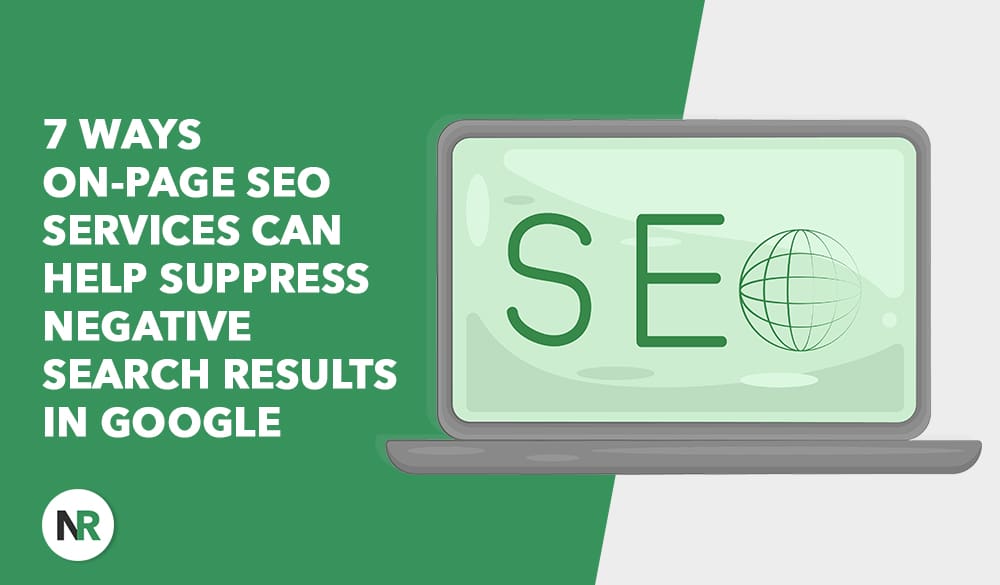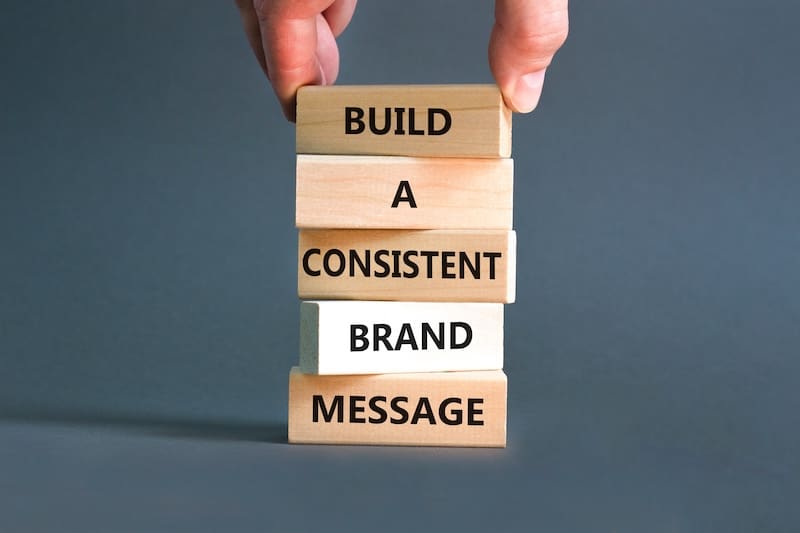Learn how on-page SEO services can create a positive digital reputation in search engine results.
Online reputation management (ORM) isn’t an optional tactic any longer. In today’s digital age, it’s a must-have survival tactic.
Executives, big brands, solopreneurs and individuals — basically, anyone with an internet presence — have to make Google results for their name reflect a positive image. After all, search engines are what often give the first impression of you or your brand to your target audience.
When forum posts from disgruntled employees, negative reviews from unhappy customers, or outdated, unflattering news stories stay on page one of the SERPs, your audience will lose trust in your brand.
There are plenty of ORM strategies that put the focus on social media engagement, review management and crisis control. However, one of the most effective and underrated tools in your arsenal is on-page SEO.
Furthermore, on-page SEO is about far more than climbing the Google Search ranks. It’s also about content suppression, meaning moving negative content so far down in search results that your audience is unlikely to ever see it. With content suppression, you can change the narrative surrounding your brand and regain your well-deserved positive reputation.
In this article, we’ll discuss the best ways to use on-page SEO services to support your ORM strategy and keep negative information at bay.
NetReputation provides information about on-page SEO services to help you protect your digital presence. Fill out the contact form below for a free consultation.
Request a Free Consultation
Types of Search Engine Optimization: On-Page SEO vs. Off-Page SEO
When it comes to SEO improvements, there are two main kinds of SEO tactics to use. Let’s go over both of them.
On-Page SEO
On-page SEO refers to all of the content you control and all of the tools at your disposal to optimize it. Related SEO services include:
- Content layout
- Internal linking
- Keyword optimization
- Metadata
- Page speed
- Structured data
This type of SEO is both contextual and technical, allowing your content to compete in search. With on-page optimization, your owned web pages can rank highly for branded queries.
Off-Page SEO
This type of SEO focuses on building authority and trust signals externally. Related SEO services include:
- Backlinks
- Digital public relations
- Social shares
This type of SEO helps Google to learn about your website’s reputation in the broader online ecosystem. While you have less control over the contextual and technical SEO aspects of third-party web pages, off-page SEO can influence how the public perceives and interacts with your brand.
7 On-Page SEO Services to Suppress Negative Content
The content that ranks highly for your brand name matters — a lot. To understand how important search engine optimization services are, consider these stats:
- DataReportal found that more than 45% of internet users go online to research products and brands.
- According to Backlinko, the top 3 Google search results get more than 54% of all clicks.
- The top organic Google search result on Google has an average CTR of 27.6%.
- Fewer than 1% of users click on a result on the 2nd SERP.
Now that you know how important it is to get your positive brand content into the top spots in Google Search, let’s discuss how you can do that while limiting your audience’s exposure to negative content. These SEO services will help with your search engine rankings, organic traffic and overall SEO campaign.
1. Create High-Authority Content
In order to suppress negative content, you need to create well-optimized web pages with high authority. According to Semrush, “Page Authority (PA) is a value score search engines place on webpages.” More importantly, the metric is used to determine how likely the page is to rank well in search results.
By creating comprehensive content that includes branded SEO search terms and aligns with user intent (also called “search intent”), you can create content that will outrank negative search results.
Content Clustering
One way to create online content with high PA is by using the content clustering technique.
With content clustering, you create a central page about a topic, then support it with various types of content related to that main topic. You’ll create blog posts, FAQ content, landing pages and more that interlink and target keyword variations related to the main topic.
For example, let’s say you run a financial consulting company, and negative content is ranking highly when you search for your business name. You could create a central page titled, “About [Business Name].” On that page, you could include information like:
- Services you offer
- Positive reviews
- Business owner profile
- History of the company
Then, you could create multiple supporting pages, such as:
- Careers, with information about the workplace culture and opportunities for employees
- Client success stories, including reviews and video testimonials
- Community involvement, with information about the brand’s philanthropy
- FAQ page with questions that target negative keywords and sets the record straight
- Founder profile, including expanded bio information and credentials
- Media coverage, with links to interviews, podcasts and other positive coverage from high-authority domains
With keyword research, you could add SEO variations of your business name to those supporting pages, such as:
- [business name] background
- [business name] CEO
- [business name] press
- [business name] reputation
- [business name] reviews
- is [business name] legit
- work at [business name]
Every page created would link back to the main topic page and two or more cluster pages. This will help the pillar page to gain link equity and eventually outrank negative search results.
2. Optimize for Branded Keywords
We touched on this above, but let’s get into it more.
The most powerful ORM assets that you have complete control over are on your website, namely your homepage, “About Us” page, “Contact Us” page and blog. On-page SEO services will fully optimize these pages for branded queries, such as “[business name] complaints” and “[business name] scandal.”
By strategically placing semantic keyword variations in page headers, metadata, alt text and body copy, you can compete against negative search results.
Semantic Keywords
Semantic keyword variations are alternative phrases that help Google better understand a page’s topic without having to rely on exact-match keywords. In other words, you don’t have to repeat the primary keyword over and over in order for search engines to understand what your page is about.
For example, if your main keyword is “[business name] complaints,” semantic keywords that you use on the page may include:
- [business name] client experiences
- [business name] issues
- concerns about [business name] services
- customer feedback on [business name]
- is [business name] trustworthy
- negative reviews of [business name]
- problems with [business name]
Using semantic keywords allows you to write naturally while still being comprehensive and clarifying to Google what your content is about.
3. Improve User Engagement
The Google RankBrain algorithm — which decides the order of the top search engine results — takes user behavior into consideration.
When a user visits your website and stays on it for a while, this tells Google that your page is valuable, which can improve its SEO ranking. On-page SEO can improve this user behavior by adding engaging multimedia, like podcast episodes and videos. Other elements that improve dwell time (how long a user spends on your web page before going back to Google results) and user engagement include:
- Interactive elements
- Strong CTAs
- User-friendly layouts
If your brand is dealing with negative content or attacks on its reputation, you can add a carousel of positive client reviews or embed an introductory brand video to increase the average time that visitors spend on your website. This can help your page rank higher for relevant keywords and push down negative results.
You can take control of your online reputation and search engine optimization, whether you’re working on your personal reputation or your professional digital presence. Call us at 844-461-3632 for more information about developing an SEO campaign.
4. Leverage Schema Markup
Schema markup — a type of code that you add to your site’s HTML — gives your content more context, which is important for search engines when determining what your page is about.
Rich snippets, like FAQs or star ratings, can dominate search engine results and grab the attention of users. Even if your content doesn’t rank above negative content yet, rich snippets make your content so eye-catching that it may still be given priority by users.
Furthermore, schema markup gives you a lot of control over how your brand information is displayed online.
5. Prevent Content Canonicalization
Professional SEO services can also help prevent canonicalization, which is when duplicate content confuses search engines, making it difficult for them to choose the right page to rank.
When your website has duplicate content that covers the same or a similar topic and is optimized for the same keywords, SEO equity gets diluted. SEO equity, also referred to as “link equity” or “link juice,” is how much authority and value a link has.
If two or more of your pages have overlapping content, neither will have the chance to attain the amount of link equity it could have otherwise. With SEO services, you can combat this in two ways:
- Create a search engine optimization strategy that avoids duplicate content.
- Use canonical tags to signal to Google which page to rank.
Why does this matter for content suppression, though? When you’re trying to rank positive content and push down negative content, you don’t want to weaken your content links. Duplicate pages struggle to rank highly, and canonicalization can get in your way of getting your positive content in the top search results.
SEO Audits To Determine Which SEO Services You Need
Running an SEO audit can help you determine which pages are causing content canonicalization. An audit can also help you find pages that should be consolidated or de-indexed to raise the SEO optimization of your site overall.
For example, low-quality pages may unnecessarily detract from stronger content. By combining information on these pages, de-indexing the weaker page, and redirecting it to the updated content, you can help that newly improved, stronger content outrank other results.
6. Optimize Image SEO
Text results in search engines aren’t the only types of harmful content to push down. On-page SEO also requires image optimization techniques to ensure the media that ranks highly is favorable.
If search engine results pages show unflattering photos of you, like embarrassing nights from your time in college or headshots from when you worked for a company with a bad reputation, you’ll want to get them off of page one.
Search engine optimization that focuses on image metadata can help. Descriptive file names, alt text and captions can help search engine crawlers learn what your content is about. And by placing images in high-authority content, you have an even better chance of getting them to rank highly.
Here are a few tips for improving the search rankings of your images:
- Add branded keywords to your image metadata.
- Compress images in a way that doesn’t lose quality so they load quickly on webpages.
- Instead of using a basic file name like “Picture1.jpg,” write a descriptive file name. Include your job title, full name, and brand name. For example, “ceo-jane-doe-company-abc-portrait.jpg.”
- Use captions to counter misinformation and add context to the images.
- Write natural-sounding alt text to accurately describe the image to vision-impaired users.
At NetReputation, we work with individuals and businesses to help them dominate search engine results pages. Give us a call at 844-461-3632 to learn more about improving your search engine rankings with SEO services.
7. Build Internal Links
An internal linking SEO strategy can better distribute PA across your entire site. An on-page SEO company will be able to find your content and other assets that are underperforming and give them a boost with internal linking.
By using optimized anchor text to link to low-performing pages from high-authority pages, those low-value links can gain authority and elevate your entire website as a result.
For example, let’s say your brand is struggling due to a high number of negative reviews. If you have a case study page on your site that could help customers trust you more, but that page doesn’t get much organic traffic or attention, you can use internal linking to improve its visibility.
With internal linking to the case study from your homepage, website footer and popular blog posts, you can help the page climb in search results and suppress negative reviews.
Final Thoughts About On-Page SEO
On-page SEO is a data-driven tool that can significantly help you improve your online reputation. While much of ORM happens in front of an audience, behind-the-scenes strategies are just as effective and important.
SEO factors like canonical tags, schema markup and UX lay the groundwork for your content and ORM strategies.
If you’re dealing with unwanted content in Google results, don’t underestimate how powerful technical SEO can be. With an ORM company like NetReputation, you’ll have help from content strategy experts and SEO consultants who can help you with your on-page SEO efforts.
Get started today with a free consultation with one of our on-page SEO experts. Call us at 844-461-3632 or fill out the contact form below.
Request a Free Consultation









